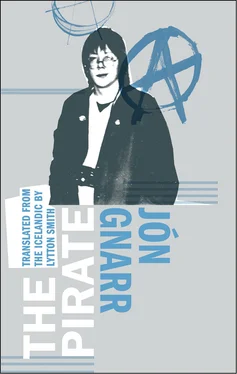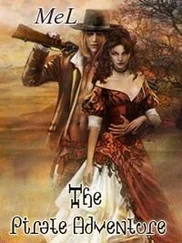I gave up on trying to play an instrument. If I was going to be in a band, I’d just have to be the singer. It was my only hope, since I was devoid of any musical talent. Alli was a guitarist, so now we were only missing a drummer, a bassist, and some rehearsal space. We were aware of one guy who knew the bass. He was called Maggi. We didn’t really know him well, but nevertheless we went to his house and rang the bell. His mother came to the door.
“Is Maggi home?”
After a little while, Maggi came to the door, a bit unsure.
“Want to be a bass player in a band?” we asked.
“What sort of band?” Maggi asked.
I was quite certain about the fact that it was a punk band we were forming. This wasn’t a comedy ska or New Wave outfit. This was not, importantly, any old rock band. This wasn’t only going to be a punk band, it was supposed to be the best punk band in all of Iceland. Alli, however, was less certain. He listened to punk and dressed like a punk, but he was still not particularly interested in the philosophy of anarchism or punk rock. He was more in it for the music and the look. I knew for a fact he listened to New Wave: to Gang of Four and the B-52s.
“A punk band!” I announced resolutely so that there would be no confusion.
Maggi wasn’t a punk. He was quite far from being a punk. He had little interest in music and didn’t know the difference between Duran Duran and the Sex Pistols. He was mainly interested in motorcycles and spent all his spare time building motor scooters in his garage at home. He was allergic to something that meant his nose was running nonstop, and he was constantly sniffing and blowing his nose. But he’d learned bass from his older brother and was willing to join us.
Now we just needed a drummer. We’d gotten our bass player. The drummer fell into our hands as if by a miracle. One day when we were hanging out by the garages in Alli’s street smoking, we heard the beat of drums carrying from within one of the garages. Someone was clearly practicing drums. The same rhythm sounded repeatedly at short intervals. Dunk dunk dunk dunk klassh. Dunk dunk dunk dunk klassh.
“Who’s that?” I asked.
“I don’t know,” said Alli.
We weren’t bold enough to knock on the garage door but waited and waited around for the drummer to show himself. After some waiting, the garage door opened and a boy, a little older than us, came out. To my great disappointment it wasn’t a punk, just some regular kid.
“Who’s that?” I asked again.
“Some kid who just moved into our street.”
He looked at us out of the corner of his eye and went straight into his house.
The next day we went and knocked for him. An older woman came to the door, and we asked for him.
“We’re looking for the boy who lives here,” I said.
“Hannes!” shouted the woman.
After a while, Hannes came down with a curious expression, though he obviously remembered us from the day before.
“Hey,” he said.
“Aren’t you a drummer?”
“Huh? Yes, sort of…”
“We heard you playing in the garage.”
He smiled, ill at ease. I got straight to the point.
“Want to join the band?”
“What band?”
“A band we’re forming.”
“What’s its name?”
We hadn’t come up with a name yet. We’d been thinking about it a lot but weren’t going to decide anything until the band was fully formed. I thought Anti-Police was a striking name, but Alli wanted something Icelandic like Brjálæðingarnir (The Madmen) or Kleppararnir (The Lunatics). His mom worked at the nuthouse, but my dad was a cop.
“We’re not ready to christen it just yet,” explained Alli.
“Is it a punk band?” Hannes asked, after looking at us.
“Yes,” I replied immediately and with some determination. I wondered whether it was possible to transform Hannes into a punk. Maybe you could trick him into getting an unusual haircut then stuff him in some torn jeans.
Hannes shrugged his shoulders and seemed pleased.
“Okay,” he said.
The band was formed. Hannes invited us in and we went into his room, which was covered in albums. I’d never in my life seen so many albums, not even in the record store Karnabær. He had hundreds of albums, and his room was like a record library: all the cabinets and shelves were full of records. On the wall hung a poster of Joan Jett and the Blackhearts. I had never heard of them before and had no idea who they were, but judging by the picture, they didn’t look like punks.
“What sort of music do you listen to?” Alli asked.
Hannes smiled, uncomfortable. He was a quiet, placid, composed kid.
“I just listen to all kinds of music,” he said.
“Punk?” I asked, with excitement in my voice.
“Yes, yes, I listen to a lot of punk.”
I was relieved. That was good news. It turned out that Hannes knew all the bands in the world and even knew the names of the members. He was a music freak, and his only hobby was listening to music and collecting records. He had just moved to Fossvogur from Vogunum. His father had recently died, so he lived alone with his mother.
“Do you have somewhere to rehearse?” he asked.
We didn’t have anywhere and were on the lookout for a garage. We couldn’t rehearse in Alli’s garage because his brother had been in a band, and his parents didn’t want any more bands in their garage. We also couldn’t use my garage because it was full of crap. Dad had recently received, free, more than a ton of old issues of the National Will that were being thrown away. Twenty years of antique National Will s now filled the garage. No one understood why he had salvaged them. Mom was both shocked and pissed.
“What the hell are you doing with this crap?!”
“It’s valuable,” Dad insisted.
“It’s crap!” Mom shouted.
Then Dad shook his head like Mom wasn’t making any sense, like she had no understanding of complex political issues. Like she came from a long line of conservatives and didn’t understand the multifaceted value of old copies of National Will . My dad got it. In the first place, the newspapers had sentimental value for him because there were articles about the political struggles of people on the left and the ideals in which he had participated. What’s more, the papers were interesting sources. In the great nothingness of his retirement, Dad planned to sit down there in the garage and go over the papers, cutting out interesting articles and pasting them into a scrapbook. Third, he thought it a crying shame to throw such a remarkable paper as the National Will out on the trash heap. Moreover, he feared that if the papers were thrown away, someone might possibly forever lose some article. But it was not only the ideals that attracted him; he also saw a financial benefit. If he kept them long enough, the papers’ rarity would potentially mean they could be sold for good money later. For him, these were valuable. But ultimately Mom would insist they move out of the garage. So Dad, all by himself, took all the papers up to the attic where they lay for years, until the two of them moved from Fossvogur into service apartments for the elderly. Dad hadn’t yet taken the time to go through the piles with scissors and a glue-stick, and Mom didn’t want to fill their little service apartment with old National Will s. Dad then spent a few evenings ringing round all the conceivable inheritors for the piles of newspapers. It was a vain effort: my father couldn’t find anyone who cared about a whole ton of old National Will s.
“Who do you think would want this crap?!” Mom shouted as he searched for phone numbers to call.
After numerous unsuccessful calls he gave up on it and gave up, finally, on the dream. Several energetic delivery van drivers came a few days later and carried the treasures away in their cars and drove them to the dump. Dad watched and sighed sadly.
Читать дальше











